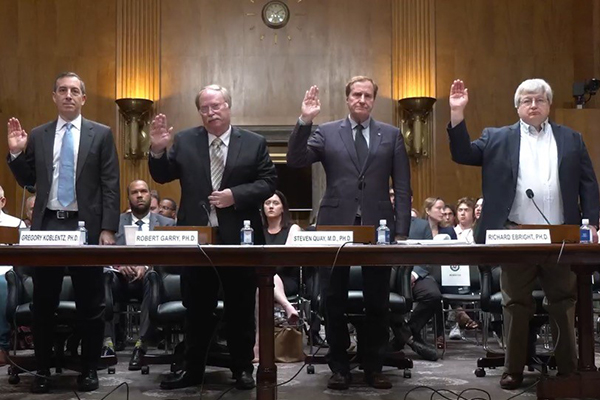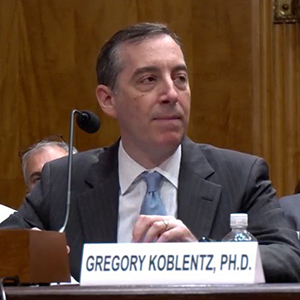In This Story

At a U.S. Senate Committee hearing on the origins of COVID-19 in June, Schar School associate professor Gregory Koblentz advocated for the creation of a new federal agency to manage the oversight of biological and pandemic risks. Koblentz, director of the Schar School’s biodefense program, emphasized that instead of trying to uncover the definitive origin of COVID-19 we should instead learn lessons from that mystery.
“Instead of looking backwards, I prefer to look forwards and plan for the future. The reality is that we are not as prepared to prevent, detect, respond to, or recover from a biological incident or pandemic as we should be, regardless of its origin,” said Koblentz, underscoring the necessity of having a robust biodefense. Strong and independent federal regulation can nip future pandemics in the bud whether they originate as a natural spillover or a lab leak.
Biodefense is a set of holistic public health policies that monitors all pandemic and biological threats, from prevention to response. The Schar School’s graduate programs in security studies, ranked No. 4 in in the nation by the U.S. News & World Report, include a specialized biodefense master’s program to educate professionals on those frontlines.

"The program is unique in my opinion,” said Zachary Berliner, a current biodefense student. “It gives you three things: essential foundations in biology you need to understand the issues, the background in defense and public health policy you need to function in the policy world, and the ability to connect these two realms to make an impact."
Building good biodefense policy in that intersection is no easy task: There are complex political, economic, and biological roadblocks. To combat these difficulties, Koblentz argued for the creation of a new federal agency to oversee the management and regulation of biological risks. A new bio-risk management administration in the vein of the Nuclear Regulatory Commission would provide a centralized set of regulations to close major holes in our biodefense.
This new agency would close a loophole in the private funding of dual-use research. Dual-use research is biological research that can cause serious harm, such as the genetic alteration of possibly dangerous biological material. While often vital for scientific advancement, dual-use research requires stringent regulation. Currently, privately funded dual-use research falls outside of federal oversight—a severe problem.
Dual-use research has stoked enough fear for Sen. Rand Paul (R-Ky) to introduce the Risky Research Review Act, a bill that instead would create an oversight board of political appointees. In an op-ed co-written by Koblentz, he urges Congress to instead think long term, wherein a new independent agency “would ensure consistent and expert oversight of high-risk biological research, free from the political influences that could compromise the proposed board.”
As anxieties about pathogens like Mpox and the H5N1 avian flu continue to fester, Koblentz is hard at work training future biodefense professionals. After all, the U.S. government and international agencies will need graduates who carry on his work.
